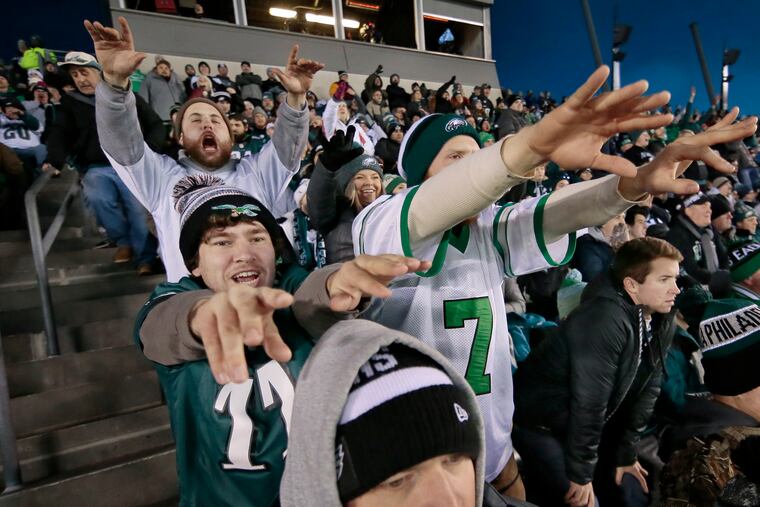The Eagles won’t have a real home-field advantage against the Rams, and it doesn’t matter anyway | Mike Sielski
Playing in front of a home crowd doesn't give an NFL team the boost it used to. So playing in an empty Linc won't change much.

When the Eagles drafted Nate Gerry in 2017, their home stadium became his home stadium – Lincoln Financial Field, seating capacity: 69,176. Sounds like a big crowd. Not to Gerry. He had played linebacker and safety for four years at Nebraska, and Memorial Stadium in Lincoln holds 90,000 people. Not to mention that Gerry had starred at Washington High School in Sioux Falls, S.D., which claims a “national record” 42 state championships and has an enrollment of more than 1,800 students. So it’s a fair bet that Washington got a good turnout for home games. Maybe not quite what a thunderdome on the Texas prairie would get, but not bad.
“I’ve been pretty fortunate,” Gerry was saying the other day, “to be in organizations and programs that are capable of filling all the seats in the stands.” So what he experienced last Sunday at FedEx Field – not the metaphorical emptiness of the Eagles' loss to Washington, but the literal emptiness of a football stadium without fans – was strange. “It definitely felt like a scrimmage or, in some ways, a practice,” he said. “It’s definitely different, something I’ve never been a part of in my career.”
To one degree or another, everyone who competed in or watched the Eagles-Washington game – or any of the other 15 games on last week’s NFL schedule, some of which featured a few thousand fans, most of which featured none – probably felt the same way.
Whether it was the clear echoes of the players' voices calling out snap counts and defensive signals or the simulated crowd noise that, on the telecast, didn’t quite sync up with the action on the field, the whole event seemed a little … off. But if nothing else can be said about America in the age of COVID-19, this can: We’re getting used to getting used to things.
» READ MORE: The most memorable Eagles home openers, from the Baker Bowl to their Super Bowl season
“Shoot, I thought it was going to be boring,” Eagles defensive end Josh Sweat said. “But as soon as I got out there, it felt normal. It felt like a regular game. Most of the time, we cut the crowd out anyways, 'cause we’ve got to focus on what we’ve got to do before the ball is snapped. I mean, after the first drive, I couldn’t even tell that there were no fans. Then everybody was just out there having fun, talking to the guys out there. Yeah, it wasn’t that different at all.”
Sweat’s point is a good one ahead of the Eagles' game this Sunday against the Rams. If it was weird to see the Eagles play at FedEx Field – a stadium that, in recent years, hasn’t exactly been rumbling and raucous anyway – seeing them play in a church-quiet Lincoln Financial Field in their home opener might feel like an experience from another dimension. And maybe it will for a while. It might even be concerning to the team and its fans, given their likely presumption that playing in front of a packed Linc would have given the Eagles a much-needed home-field advantage – one that the pandemic has stripped away.
“The biggest thing is being able to adapt as a team, being able to adapt with no fans and knowing we have to bring our own energy,” defensive tackle Fletcher Cox said. “Players, coaches, everybody – we have to bring our own energy and keep that energy on the sideline. We all we got that’s on the sideline. We keep that energy up, and that’s going to help a whole lot.”
I’m not sure how true that presumption is, though. For one thing, as I’ve written before, there’s plenty of evidence suggesting that, over time, the Eagles' home-field advantage, relative to other teams', has been overstated. It’s nice, and self-congratulatory, for Philadelphia sports fans to believe that their influence is greater than that of any other fan base, that their passion can propel the Eagles to victory. The players and coaches themselves might believe it, too, or at least pay lip service to it. But it really isn’t so.
For another, home-field advantage in the NFL, on the whole, ain’t what it used to be. As the New York Times noted earlier this year, home teams won 51.7% of NFL games last season, the lowest mark since 1972 and a significant decline from the 1990s, when they won nearly 60% of the time. Last week’s slate of games fit that pattern, despite the reduced or non-existent attendance at them: Eight home teams won, by an average of 12.1 points per game. Eight road teams won, by an average of 6.1 points per game.
And since Super Bowl LII, the Eagles have followed the trend, too. Have they been a better team at the Linc? Yes. Have they been a much better team at the Linc compared with the team they’ve been away from it? Eh. They’ve played 35 regular-season and playoff games over those two years. They’re 10-7 at home and 9-9 on the road.
So no matter how strange this season’s games might seem to the people coaching and playing and watching them, the sounds of silence probably won’t help or hurt home teams all that much, and the same goes for the Eagles on Sunday. Some 70,000 fans will miss the fun and camaraderie of tailgating and cheering for their favorite team in South Philadelphia, but their absence won’t affect the game’s outcome as much as, say, Lane Johnson’s or Aaron Donald’s presence will. The irregular can still be irrelevant.